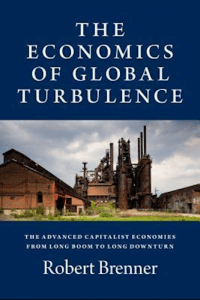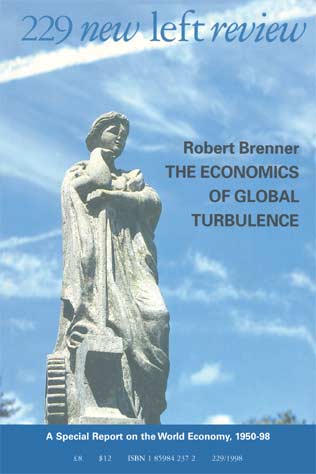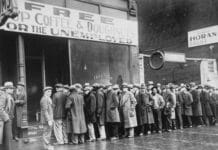Emneliste med diskussion af Robert Brenners artikler og bøger om den kapitalistiske verdensøkonomi.
Forord
Den amerikanske historiker Robert Brenner skrev i 1998 et helt nummer af tidsskriftet New Left Review: “Uneven development and the long downturn: the advanced capitalist economies from boom to stagnation, 1950-1998” (No.229, May/June 1998, 265 p.). Er også kendt under omslagstitlen: “The economics of global turbulence: a special report on the world economy, 1950-98”. Efterfulgt af to bøger: The boom and the bubble: the US in the world economy (Verso, 2002, 303 p.) + The economics of global turbulence (Verso, 2006, 370 p.).

Analysen har rejst en omfattende debat om marxistisk kriseteori og den kapitalistiske verdensøkonomis historiske og aktuelle udvikling. Vi har her samlet noget af den internationale venstrefløjs debat fra tidsskrifter og internettet.
Robert Brenner er professor i historie på UCLA, Californien og forfatter til vigtige artikler/bøger om overgangen fra feudalisme til kapitalisme. Han er desuden medlem af den amerikanske socialistiske organisation Solidarity, og medredaktør på deres tidsskrift Against the Current.
September 2000.
Revideret og ajourført januar 2008 + september 2023.
Foreword

The US historian Robert Brenner wrote in 1998 a special issue of the journal New Left Review: “Uneven development and the long downturn: the advanced capitalist economies from boom to stagnation, 1950-1998” (No.229, May/June 1998, 265 p.), also known under the title of the cover: “The economics of global turbulence: a special report on the world ecoomy, 1950-98”. Succeeded by two books: The boom and the bubble: the US in the world economy (Verso, 2002, 303 p.) + The economics of global turbulence (Verso, 2006, 370 p.).
The analysis has led to a huge debate on the Marxist theory of crisis and the historical and present development of the capitalist world economy. We have collected some of the debate from the international left, as published in journals and on the Internet.
Robert Brenner is a professor in history at UCLA in California, and is the author of important articles and books on the transition from feudalism to capitalism. Besides that he is a member of the US socialist organisation Solidarity, and is a co-editor of their bimonthly Against the Current.
Robert Brenner og den kapitalistiske verdensøkonomi
Against the Current
Behind the economic turbulence. Suzi Weissman interviews Robert Brenner (No.200, May/June 2019)
“Today we’re going to talk about the state of the economy. I’ve invited Robert Brenner back for the hour in conversation on politics and the economy, matters of great confusion if you read the business pages and hear the politicians all touting record low unemployment, rising wages, and the recovery of the stock market.”
The economy in a world of trouble. Interview with Robert Brenner (No.139, March/April 2009)
“The current crisis is more serious than the worst previous recession of the postwar period, between 1979 and 1982, and could conceivably come to rival the Great Depression, though there is no way of really knowing. Economic forecasters have underestimated how had bad it is because they have overestimated the strength of the real economy …”
Bob Brenner: Devastating crisis unfolds (No.132, January/February 2008)
“The current crisis could well turn out to be the most devastating since the Great Depression. It manifests profound, unresolved problems in the real economy that have been ‘literally’ papered over by debt for decades, as well as a shorter term financial crunch of a depth unseen since World War II.”
See also Review by Bill Jefferies (Permanent Revolution, January 2008)
Economic turmoil from USA to Brazil. An interview with Bob Brenner (No.107, November/December 2003, p.33-36)
“It is generally believed by Wall Street economists that the U.S. economy is finally starting to pick up steam. It must be said that, so far, there is little direct evidence for this. Nevertheless, it may well be that the sheer size of the stimulus is finally bringing about an acceleration. But even if a significant economic speedup is now materializing, its sustainability is very much open to question, because it will likely depend on the same debt-dependent consumption and expanding financial bubbles that have kept the U.S. economy turning over since the start of the cyclical downturn at the end of 2000.”
Robert Brenner: An economy of two, three many Enrons (No.100, September/October 2002, p.35-40)
“Corporate accounting frauds are the direct outgrowth of a deeply flawed U.S. economic boom between 1995 and 2000 that was largely driven by an historic run up of stock prices – rather than vice versa. Their raison d’etre was straightforward. To cover up the reality of an increasingly desperate corporate profits picture.”
Robert Brenner: The economy after the boom (No.98, June 2002, p.28-33)
“The long U.S. economic expansion has ended. Whatever the outcome of the current recession, the odds are against a return to the boom conditions of the second half of 1990s. It may indeed be difficult over the medium run to avoid stagnation/slow growth, or even worse.”
Peter Camejo: The great bull market vs. ’looming crisis’: on Brenner’s theory of crisis (No. 80, May/June 1999, p.26-31)
“Camejo suggests that the predictions of a crisis for the U.S. economy are probably exaggerated.”
Loren Goldner: ‘Total capital’ rigor and international liquidity: a reply to Robert Brenner (No.80, May/June 1999, p.31-34)
“Goldner argues that Brenner if anything understates the extent of a crisis already produced by capital’s looting of the Third World and devastation of the productive economy at home.”
Mary C. Malloy and Charlie Post: A reply to Robert Brenner (No.79, March/April 1999, p.36-38)
“While Brenner’s analysis rightly focuses on profitability as the driving force of economic growth and stagnation, and on the process of creative destruction as essential to the restoration of profitability, his analysis is both theoretically and empirically flawed.”
Hillel Ticktin: Accumulation and the control of labor (No.79, March/April 1999, p.39-42)
“Bob Brenner starts with the rate of profit and argue that it has declined over time and hence caused problems in the accumulation of capital. I will argue instead that capital’s present difficulties flow from a breakdown in the system of controlling labor that was inherent in the Cold War.”
Richard Walker: Capital’s global turbulence (No.78, January/February 1999, p.29-35)
“The complexities of uneven development decade by decade are crucial to the case, as in the exact timing of profit decline and wage demands in the sixties. The bulk of Brenner’s essay is taken up with such details, which can be brought under some control by a short outline of the history and geography of global capitalist expansion and contradiction.”
Robert Brenner: The looming crisis of world capitalism (No.77, November/December 1998, p.22-26)
“Marxist economist are famous for having accurately predicted seven out of the last one international economic crisis. Perhaps for that reason, many in recent times have been unusually cautious about once again ‘crying wolf’, even as the evidence of international economic dislocation has mounted around them.”
Robert Brenner: Clinton’s failure & the politics of U.S. decline (No.56, May/June 1995)
“The ‘politics of decline’, maturing over two decades or more, reflects the newly emergent contours of the American economy and the structure of social forces that the economy now supports. The aim of this essay is to specify the basic elements of this politics and explain the socioeconomic and political transformation that lies behind it.”
The Asia-Pacific Journal
R. Taggart Murphy: In the eye of the storm: Updating the Economics of Global Turbulence, an introduction to Robert Brenner’s update (pdf) (7 December 2009)
“Brenner has now added a long introduction to The Economics of Global Turbulence (2006) that could almost stand as a separate volume. The depth and breadth of the analysis is unrivaled in the literature that has emerged since the crash. And Brenner shows us how certain Marxian insights – suitably updated – can indeed shed light on the place we find ourselves in this fatal juncture of human history.”
See also Robert Brenners new introduction: What is good for Goldman Sachs is good for America: The origins of the current crisis (pdf) (UCLA, 18 April 2009, 73 p.)
Overproduction not financial collapse is the heart of the crisis: the US, East Asia, and the world (29 Januar 2009). Robert P. Brenner speaks with Jeong Seong-jin.
“Marxist economic historian Robert Brenner offers a critique of the capitalist system, and describes the source of today’s economic crisis as an overcapacity in global manufacturing that is being replicated in Asian countries, thereby perpetuating the crisis. The downward slide toward an asset-price Keynesianism, or ‘bubblenomics’, has also contributed to the current state of the global economy and proposes that the only way out of the crisis is crisis itself.”
Capital & Class
Gerard Dumenil, Mark Glick and Dominique Levy: Brenner on competition (pdf) (No.74, Summer 2001, p.61-77)
“This paper criticizes Brenner’s emphasis on competition within Manufacturing in his analysis of the falling profit rate, inversing the relationship between the decline of the profit rate and competition as in Marx. Assumptions concerning price competition appear arbitrary and proofs are deficient. Brenner cannot escape the reliance on the rise of wages.”
Ben Fine, Costas Lapavitsas, Dimitris Milonakis: Addressing the world economy: two steps back (pdf) (No.67, Spring 1999, p.47-90)
“Several decisive weaknesses of Brenner’s contribution are identified. First, Brenner’s theoretical treatment of capitalist competition and accumulation is in the spirit of Adam Smith and mainstream economics rather than Marx. Second, Brenner ignores the significance of credit for capitalist crisis. Third, he leaves entirely out of account the internationalisation of production and finance, phenomena which constitute the most salient feature of the contemporary global economy. Fourth, in short, Brenner’s approach is not at all value-theoretic, a weakness that can also be found i some of his earlier historical works.”
Challenge
The boom, the bubble, and the future (pdf). Interview with Robert Brenner (Vol.45, No.4, July/August 2002, p.6-19; online at Internet Archive)
“In his new book The boom and the bubble, historian Robert Brenner presents a view of economic events over the past quarter century that both conservatives and liberals can disagree with. But in a time when few have made cogent sense of the recent past, Brenner presents one of the most comprehensive analyses available. He believes that capital investment and profitability are the prime source of economic dynamism in general and productivity growth in particular.”
James Crotty: Review + replies from Robert Brenner (Vol.42, No.3, May/June 1999, p.108-119 + p.119-130)
“Those of us who, unlike Brenner, believe that the ongoing global crisis is best understood as the outcome of the complex interaction af many different contradictions in the accumulation process – including the dynamics of capital-labor conflict – can deeply enrich our understanding through the insights Brenner has given us on the unplanned and anarchic nature of capitalist competition.”
Comparative Studies of South Asia, Africa and the Middle East
Symposium: Robert Brenner’s Economics of global turbulence (No.2, 1999, p.41-85)
“We present the essays that were adressed to Brenner’s book along with an extensive response from the author, which clarifies his original arguments and extend them in a new directions.”
Frederic Jameson: Turbulence in Brenner (p.43-46)
Vasant Kaiwar: The dilemmas of late capitalism (p.47-52)
Kenneth Surin: Standing Schumpeter on his head (p.53-60)
Robert Brenner: Reply to critics (p.61-85)
Green Left Weekly
Eva Cheng: ‘The ‘Brenner debate’: an unfolding debate about the capitalist crisis (No.410, 28 June 2000)
“Released hard on the heels of the 1997-98 Asian economic crisis, which was threatening to become a global meltdown of the capitalist system, Robert Brenners book-size thesis … has attracted considerable attention from the left internationally.”
The Guardian
Robert Brenner: That hissing? It’s the sound of bubblenomics deflating (26 September 2007)
“Merely cutting the cost of borrowing will do little to remedy the long-term weaknesses of the advanced economies.”
See also Comment by Bill Jefferies (Permanent Revolution, October 2007; online at Internet Archive.)
Historical Materialism
Robert Brenner: What is, and what is not, imperialism? (Vol.14, No.4, 2006, p.79-105)
“Robert Brenner takes issue with the distinction between a territorial and a capitalist logic of power, arguing that David Harvey’s own account actually demonstrates the subordination of the territorial logics to the capitalist logic of power.”
Symposium : Robert Brenner and the world crisis:
Part 1 (No.4, Summer 1999, p.3-179) + Part 2 (No.5, Winter 1999, p.3-230)
“Brenner has launched on the world a magisterial and thoroughly researched reinterpretation, both of the post-war history of world capitalism and of the Marxist theory of crisis … This is the first part of a symposium in which leading Marxists adress the explanation of global crisis with reference to Brenner’s text. Given the richness and variety of the contributions we received, we have taken the exceptional step of spreading this symposium over two issues.”
Part 1 (No.4, Summer 1999, p.3-179):
Alex Callinicos: Capitalism, competition and profits: a critique of Robert Brenner’s theory of crisis (p.9-31)
Guglielmo Carchedi: A missed opportunity: orthodox versus Marxist crises theories (p.33-55)
Simon Clarke: Capitalist competition and the tendency to overproduction: comments on Brenner’s ‘Uneven development and the long downturn’ (p.57-71)
Gérard Duménil and Dominique Lévy: Brenner on distribution (p.73-94). The article is online at the authors site.
Chris Harman: Footnotes and fallacies: a comment on Robert Brenner’s ‘The economics of global turbulence’ (p.95-104)
David Laibman: Perspectives on Brenner (p.105-108)
Michael A. Lebowitz: In Brenner, everything is reversed (p.109-129)
Fred Moseley: The decline of the rate of the profit in the post-war United States economy: due to increased competition or increased unproductive labour? (p.131-148). The article is online at the author’s site.
Murray Smith: The necessity of value theory: Brenner’s analysis of the ‘long downturn’ and Marx’s theory of crisis (p.149-169)
Ellen Meiksins Wood: Horizental relations: a note on Brenner’s heresy (p.171-179)
Part 2 (No.5, Winter 1999, p.3-230):
Werner Bonefeld: Notes on competition, capitalist crises and class (p.5-28)
Alan Freeman: Crisis and the powerty of nations: two market products which value explains better (p.29-75)
Michel Husson: Riding the long wave (p.77-102). The article is online at the author’s site.
Anwar Shaikh: Explaining the global economic crisis (p.103-144). The article is online at Internet Archive.
Tony Smith: Brenner and crisis theory: issues in systematic and historical dialectics (p.145-178)
Richard Walker: Capitalism’s recurrent self-criticism: an evaluation of Bob Brenner’s ‘Global economics’ (p.179-210)
John Weeks: Surfing the troubled waters of ‘Global turbulence’: a comment (p.211-230)
See also:
ISJ / Historical Materialism Dayschool 2004:
Capitalism: Where it came from and where it’s going. Articles by Robert Brenner. Scroll down.
In Defence of Marxism
Mick Brooks: Rate of profit and capitalist crisis (April 2003; online at Internet Archive)
“In reviewing Robert Brenners theories, Mick Brooks looks at the causes of capitalist crisis and delves into such questions as the tendency for the rate of protit to fall and overproduction. This article is to be considered as a contribution to the debate among Marxists on the causes of capitalist crisis.”
International Socialism
Jane Hardy: Toil and trouble: the nature of US economy (No.98, Spring 2003, p.125-138)
“In the current climate Brenner’s book has profound relevance in setting the context for US capitalism and imperialism … Those who want to both understand the nature of the beast and change the world will find much of interest in the book.”
Rob Hoveman: Brenner and crisis: a critique (No. 82, Spring 1999, p.57-74)
“In an analysis influenced by Marxism, Brenner has sought to provide an analysis of the transition from the long boom through to the period of instability (‘the long downturn’, as he calls it) which set in at the end of the 1960s. He also outlines an explanation for why this period of instability has persisted for so long. Whilst his explanation for the transition is flawed and inadequate, there is much empirical detail from which anyone seeking to develop an understanding of the crisis of the world capitalism will benefit.”
See also:
ISJ / Historical Materialism Dayschool: Capitalism: Where it came from and where it’s going.
International Viewpoint
Robert Brenner: The economy after the boom: a diagnosis (No.342, July/August 2002)
“The long U.S. economic expansion has ended. Whatever the outcome of the current recession, the odds are against a return to the boom conditions of the second half of 1990s. It may indeed be difficult over the medium run to avoid stagnation/slow growth, or even worse.”
Jacobin
Seth Ackerman: Robert Brenner’s unprofitable theory of global stagnation (12 September 2023)
“Robert Brenner’s theory of the post-1973 global economy — which depicts a long era of ‘stagnation’ caused by chronic industrial overcapacity — is logically dubious and doesn’t fit the facts. But the theory’s biggest problem is its politics.”
See also critique from Michael Roberts: On profitability and reforming Capitalism (Spectre, October 11, 2023).
Lars Henrik Carlskov blog
Verdensøkonomien foran afgrunden – interview med Robert Brenner (12. april 2009)
“Den marxistiske økonomiske historiker Robert Brenner svarer i dette interview på spørgsmål om krisen og bl.a. finansialisering, Obama, regulering, USA’s hegemoni og Kinas situation.”
Left Business Observer
Doug Henwood: Crisis update (No.85, September 1998)
“Though profit rates sagged, Brenner emphasizes, big multinationals (though he curiously makes nations, not capitals, the main subject of his narrative) didn’t scrap old plants; they kept working them, exerting further downward pressure on prices, even though the system would be better served by weaker ones going under. In the old days, a deep depression might have cleared away all this excess capacity, but throughout the 1970s and early 1980s, big government deficits propped up demand, preventing the liquidation. In other words, for Brenner, the system suffered from a lack of exit.”
London Review of Books
Robert Brenner: Towards the precipice: on the crisis in the US economy (Vol.25, No.3, 6 February 2003)
“The fact remains that Wall Street analysts were reporting in late January that the economy had probably contracted in the fourth quarter of 2002: either the recession was worsening or the dreaded double dip had begun. For the first time, public opinion polls are recording less than 50 per cent approval of the Administration’s handling of economic affairs and, perhaps not unrelatedly, that citizen support for the war on Iraq is down. The road ahead, for the US economy and for the Bush Administration, is going to be a rocky one.”
Marxistarkiv.se
Markus Christian Hansen: Robert Brenner: Från feodalsamhället till kapitalismen (pdf) (9. januar 2024)
Denna artikel är från tidskriften Röda Rummet, december 2023: “Detaljerna i diskussionen om den historiska övergången från medeltidens feodalism till det kapitalistiska system som råder idag kan lätt framstå som akademiskt hårklyveri. Men som Markus Christian Hansen visar i sin introduktion till Robert Brenners tänkande har debatter kring dessa frågor lett till avgörande skiften i synsätt och till begreppsutveckling med vittgående konsekvenser för politiskt handlande i nutid.”
Monthly Review
Robert Brenner: Competition and class: a reply to Foster and McNally (Vol.51, No.7, December 1999, p.24-44)
“… David McNally and John Foster take issue with the emphasis on cost-cutting competition in my account of falling profitability. They regard this as something of a heresy against Marxist orthodoxy, and thus highly problematic. But they do not identify substantive problems in the argument.”
John Bellamy Foster: Is overcompetition the problem (Vol.51, No.2, June 1999, p.29-37)
“The main weakness of the The economics of global turbulence, in my view, is that Brenner in this case failed to pay sufficient his own warning. We cannot reduce capitalism to competition, and hence to a Smithian-style ‘invisible hand’ – whether ‘malign’ or otherwise – without losing sight of the very basis of the critique of accumulation: the reality of exploiation and class.”
David McNally: Turbulence in the world economy (Vol.51, No.2, June 1999, p.38-52)
“One of the merits of Robert Brenner’s recent study is that it locates the roots of economic turbulence not in the machinations of financial speculators, but in the very basic dynamics of capitalist accumulation. And that carries, at least implicitly, a crucial political message: That the solution lies in overturning the domination of capital, not simply in regulating the markets.”
MR Online
When Neoliberalism implodes (Audio) (December 2007)
“Left Perspectives on the current political economy. A discussion with Robert Brenner and Sam Gindin at Brecht Forum. Moderated by Vivek Chibber.”
See also: Follow-up commentary on the Gindin-Brenner debate (5 January 2008). Comments from Louis Proyect, Robert Brenner, Sam Gindin and Patrick Bond.
The Nation
Walden Bello: Drop till we shop?: Brenners world (21 October 2002)
“The picture he draws is not one of corporations denationalized by economic integration and states whose powers have been eroded, as in much current writing on globalization. In Brenner’s global economy, state elites battle to gain a competitive edge for their corporate elite.”
New Left Review
“Bidenism analysed as the outcome of a bipartisan lurch towards growthless Keynesianism, in a new stage of capitalist accumulation emerging from the long downturn. Classes—and class politics—redefined in a strikingly original intervention.”
See debate:
Matthew Karp: Party and class in American politics (No.139, January-February 2023, p.131-144). “In reply to Riley and Brenner’s ‘Seven Theses on American Politics’, mapping class and party shifts to a new regime of accumulation, Matthew Karp asks how far they break with conventional cultural explanations for the blue-collar GOP vote. Have deeper transformations in the Democratic Party—its hegemony within the country’s most dynamic capitalist sectors—elicited a backlash from its historic base?”
Some questions about political Capitalism (No.140/141, March-June 2023; only first page online). “Responding to Riley and Brenner’s ‘Seven Theses on American Politics’ in NLR 138, Tim Barker probes the analysis of global manufacturing overcapacity and declining profit rates on which their diagnosis of a new regime of ‘political capitalism’ is based. Does Bidenomics entail just another round of politically engineered upwards redistribution?”
A dissipating glut? (No.140/141, March-June 2023; only first page online). “Can Biden’s green fiscal stimulus kickstart a sustained dynamic of capital accumulation? Replying to critics of Riley and Brenner’s ‘Seven Theses’, Aaron Benanav defends and extends Brenner’s account of the long downturn, charting the epochal implications of shifts in demand, from agriculture to industry to services.”
Reflections on ‘Political Capitalism’ (No.142, July-August 2023, p.5-27). “In a probing response to Dylan Riley and Robert Brenner’s ‘Seven Theses on American Politics’, Lola Seaton interrogates the claim that a novel regime of accumulation has emerged from the long downturn and unravels the conjunctural complexities—political, economic, environmental, geo-political—at stake in the debate that has ensued.
Robert Brenner: Escalating plunder (No.123, May/June 2020, p.5-22)
“In the US, amid soaring unemployment, loss of health insurance and rising poverty, a $4 trillion hand-out to capital, with Biden’s party and Trump’s shoulder to shoulder. Robert Brenner analyses the Covid-19 bailout in the broader context of a faltering productive economy and growing elite predation.”
Symposium on ‘The economics of global turbulence’ (No.54, November/December 2008). Only abstracts online.
“In this issue we publish a symposium on the book which emerged out of this essay, The Economics of Global Turbulence (2006). Three distinguished scholars, from the Anglosphere (Nicholas Crafts), the Eurozone (Michel Aglietta) and the Far East (Kozo Yamamura), give their critical assessment of Brenner’s work.”
Robert Brenner: New boom or new bubble? (No.25, January/February 2004, p.57-100)
“The shape of the US economy as it emerges from recession, in election year. With the giant manufacturing sector still crippled by over-capacity, can the take-off be sustained by bubble-driven finance, retail and construction booms?”
The article is online at International Socialism.
Giovanni Arrighi: The social and political economy of global economy (No.20, March/April 2003, p.5-71). Omslagstitel: Tracking global turbulence.
“In a landmark engagement with Robert Brenner’s account of the long downturn of the world economy since the 70s, Giovanni Arrighi lays out a social and political economy of the roles of labour unrest, national liberation and corporate financialization in the crisis of the post-war order, and the prospects for a militarized US hegemony today.”
Robert Brenner: The boom and the bubble (No.6, November/December 2000, p.5-43)
“In the last four years, the US economy has posted its best performace since the sixties. What is the connexion between the formidable boom in the real economy and the historically unprecedented bubble on the stock market? Could the inflation of asset values far beyond the rise in corporate earnings be preparing a Japanese-style nemesis?”
Robert Brenner: Uneven development and the long downturn: the advanced capitalist economies from boom to stagnation, 1950-1998 (No.229, May/June 1998, p.1-265). Omslagstitlen: The economics of global turbulence: a special report on the world economy, 1950-98.
“The whole of this issue is devoted to a study of the world capitalist economy, from 1945 to the present … In New York, the most fashionable magazine of the hour has called for the award of a Nobel Prize to the first thinker able to explain the laws of motion of the global economy in which we live. Given the complexion of the Prize committee, there is little danger of that. But Marx’s enterprice has certainly found its successor.”
Review of International Political Economy
Robert Brenner: The world economy at the turn of the millennium toward boom or crisis? (No.1, Spring 2001, p.6-44)
“This paper addresses the question of whether the long stagnation that gripped the world economy for a quarter century after 1973 has been transcended.To do so, it offers an account of the long downturn, in terms of the fall and the failure of recovery of the profitability, especially in the international manufacturing sector, itself rooted in the rise and persistence of over-capacity and over-production on a system-wide scale, originating in the intensification of international competition between 1965 ad 1973.”
Review of Radical Political Economics
Ajit Zacharias: Competition and profitabily: a critique of Robert Brenner (No.1, Winter 2002, p.19-34)
“Robert Brenner has argued in a recent essay that the decline in manufacturing profitability in the United States since the mid-1960s can be attributed mainly to intensified foreign competition. I attempt to show that Brenner’s argument is logically incongruent, and does not fit with the observed behavior of the profit rate and the manufacturing trade balance. I also argue that Brenner’s rejection of Marx’s theory of the falling profit rate is questionable.”
Robert Brenner: Competition and profitabilty: a reply to Ajit Zacharias (ibid., p.35-44)
Gérard Duménil and Dominique Lévy: Manufacturing and global turbulence: Brenner’s misinterpretation of profit rate differentials (ibid., p.45-48)
“Robert Brenner’s analysis of the structual crisis of the late 20th century … is based on the observation of the decline of the profit rate, as is common among Marxist economists. Instead of a the usual reference to the features of technical change, Brenner explains the decline of profit in the whole economy by its fall within manufacturing industries, resulting from excess international competition.” See the article online (pdf).
Robert Brenner: The trajectory of the manufacturing profit rate: a reply to Duménil and Lévy (ibid., p.49-56)
Socialist Outlook
Andy Kilmister: Simply wrong (No.20, 1999)
“Analytically, despite individual insights, Brenner fails to help us understand the long boom and the following downturn, and by extension the current economic crisis. He is certainly right to argue that inter-capitalist competition must be a part of any explanation of booms and crises. But this is hardly a new insight, and the links Brenner proposes between such competition and other key areas, for example class struggle and technological change, are simplistic and misleading. Politically, however, the book is even more problematic.”
Socialist Register
Sam Gindin: Turning points and starting points: Brenner, left turbulence and class politics (2001)
“For Brenner, the golden age of capitalism ended some three decades ago and we are living through an age of capitalism in crisis. The reading in this essay suggest, in contrast, that from the perspective of capital the golden age is now.”
Socialist Review
Rob Hoveman: Stormy waters (No.309, September 2006; online at Internet Archive)
“Eight years ago an entire edition of the journal New Left Review was devoted to Robert Brenner’s analysis of contemporary capitalism under the title The Economics of Global Turbulence. Now Verso has reprinted that long out of print journal article, with a new preface and an 80-page afterword, in which Brenner covers developments over the last eight years.”
Alex Callinicos: Just like my dreams they fade and die (No.264, June 2002, p.30-31; online at Internet Archive). Scroll down.
“Understanding the real dynamics of US capitalism urgently demands clear and critical thinking. The Marxist historian Robert Brenner takes us some way towards such an understanding in his latest book.”
Solidaritet
Verdensøkonomien foran afgrunden. Interview med Robert Brenner (nr.2, maj 2009; online på Modkraft)
“Den marxistiske økonomiske historiker Robert Brenner svarer i dette interview på spørgsmål om krisen og bl.a. Obama, regulering, USAs hegemoni og Kinas situation.”
Robert Brenner: En ødelæggende krise udfolder sig (nr.1, februar 2008, s.18-21; online på Internet Archive)
“Den førende marxistiske økonom og historiker Robert Brenner analyserer her den økonomiske krise. Regeringerne står nu over for vanskeligheder af et uhørt omfang, skriver Brenner.”
Albert Jensen: Kapitalens globale krise (nr.4, december 1999, s.4-13; online på Internet Archive)
“Det er skæbnens ironi, at samtidig med at kapitalismens hysteriske tilhængere i disse år erklærer kapitalismen (den såkaldte markedsøkonomi på ny-dansk) for ideologiernes sejrherre, og samtidig med at neoliberalismen har erklæret historien for død, da tvinger den økonomiske krise i Sydøstasien og siden i Rusland og Brasilien den kapitalistiske verden i knæ. Samtidig har den kapitalistiske verdens borgerlige økonomer offentligt måttet erkende, at deres ‘teorier’ ikke længere kan forklare udviklingen i de reelt eksisterende kapitalistiske lande. Til gengæld har marxismen – der ellers er blevet erklæret for død som politisk doktrin – en forklaringsevne, der langt overgår lommeuldsteoretikerne.”
Albert Jensen: Kriser skyldes overskud af kapital (nr.1, marts 2000, s.24-30)
“Solidaritet bragte sidste nummer en artikel om Brenners analyse af verdensøkonomiens udvikling (Kapitalens globale krise). Nærværende artikel tager nogle af de diskussioner og kritikker af Brenner op, der er foregået i den angelsaksiske verden.”
Spectre
Robert Brenner: What is good for Goldman Sachs is good for America: The origins of the current crisis (pdf) (18 April 2009, 73 p.)
“This text appears as the Prologue to the Spanish translation of the author’s Economics of Global Turbulence (Verso, 2006) which was published by Akal in May 2009.”
See also:
R. Taggart Murphy: In the eye of the storm: Updating the Economics of Global Turbulence, an introduction to Robert Brenner’s update (The Asia-Pacific Journal, 7 December 2009)
Vardøger
Robert Brenner: Verdensøkonomien ved årtusenskiftet – i retning oppsving eller krise (nr.26, april 2000, s.42-75)
Revideret udgave af et indlæg på konference om Labour in the global economy, Manchester University, foråret 1999.
What Next?
Bernard H. Moss: The economic crisis of world capitalism (No.12, 1999; online at Internet Archive)
“Brenner’s analysis has more in common with that of the monetarists and capitalist globalisers than with that of the left … Brenner has come a long way from Marxist thinking, but his analysis, in its neglect of national and labour politics. Class struggle in the wider sense are missing from Brenner’s account. The working class is presented only as victim, whose efforts at redress are broken by disinvestment and employer repression.”
Workers Liberty
Martin Thomas: The boom and the bubble (No.25, August 2002)
“Robert Brenner’s new book carries forward the argument of his much-discussed survey of the whole course of capitalism since 1945, The Economics of Global Turbulence (1998), to deal with the USA’s bubble-boom of 1997-2001 and the prospects now.”
Martin Thomas: The thesis of ‘ruinous competition’ (July 2002)
“Brenner’s is a heroic effort to integrate a great mass of information (about capital-versus-labour battles as well as capital-versus-capital) into a coherent story, but I find it ultimately unsatisfactory both on how the increased competition reduced profit rates, and on overcapacity ‘sticking’.”


































